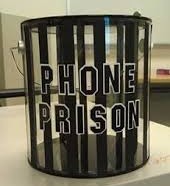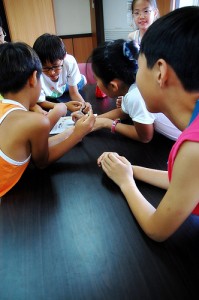
Class rules
 I could have just jumped straight to the fun an games but first comes rules. It is important to have class rules, otherwise chaos will keep you from teaching and your students from learning. Some teachers like to get the students themselves to make posters with the rules they think are important and put them up in the classroom. Children appreciate consistency so try not to change your rules part way through a semester or they will be less likely to cooperate.
I could have just jumped straight to the fun an games but first comes rules. It is important to have class rules, otherwise chaos will keep you from teaching and your students from learning. Some teachers like to get the students themselves to make posters with the rules they think are important and put them up in the classroom. Children appreciate consistency so try not to change your rules part way through a semester or they will be less likely to cooperate.
To fix the problem of children playing with toys or cell phones during your class, have them leave their bags and coats at one end of the classroom, just taking out what they need for the lesson. If you find a phone in use, put it in the phone prison!
Classroom activities
Lessons for children need to be fun and VARIED! A lesson type or game that worked today will not work every day even if it’s great.
1. Use games and cooperative learning.
English games are an essential part of an English lesson for children AND adults. Let your students build social skills and get better at teamwork and pair work.Having competitive team games or offering rewards such as candy or class coupons really help kids’ motivation. Some of my favorites using teams are the A to Z Board Race and Pictionary using words that they’re learning. A less active variation on the A to Z Board Race is to give each pair of students this table in Word format with categories at the top and the alphabet down the left. When the teacher announces a random letter, the pairs race to write words starting with that letter for each of the categories. Students can yell stop if they’ve written in at least 2 categories. Then, pairs get one point for each totally correct word and half a point if a word is correct but misspelled. (Thanks to Daniella Djiogan for sharing this game.)
If your students are able to ask and answer basic questions and know some famous actors and musicians, and sports starts, they’ll probably enjoy playing “Who am I?” Here’s how: on pieces of paper, write the names of famous people like “Lady Gaga” or “Michael Jordan,” making sure the names you use are those of well-known, popular personalities. Pin those slips of paper on the backs on each player. Every person then asks their fellow student questions in English that will help him guess the name written on the paper attached to his back. Note, all questions must have “yes” or “no” answers.
2. They like to move it, move it.
Don’t make your students sit still for the whole class. Have some movement games in the lessons, create treasure hunts around your school, or simply have them get up and move seats every 20 minutes or so. Try running dictation and this sentence construction game.
 3. Music and song work great if you’re enthusiastic.
3. Music and song work great if you’re enthusiastic.
If you’re not already willing to laugh at yourself and get silly, now is the time! Teach your students songs in English. Action and camp songs like “Baby Shark” and “Peel Banana” are two of my favorites. Also, get them to write different words to existing songs.
4. Children love visual activities.
Drawing pictures, making posters, making magazines, etc., all of these are great ways of teaching English in a fun way. Let them be creative. Use technology for creative expression if you have access to computers on the internet. With older students, make vision boards and let them express their goals and dreams visually!
5. Have students tell stories.
There are so many activities you can do based around English stories, including giving creative story prompts or picture prompts for them to make stories, giving them a story to act out or draw pictures for, or getting them to orally tell or write stories in groups.
Here’s how to do a story roundabout: A child or teacher begins a story, which each child in turn continues by adding a sentence. (Adding only one word at a time can vary it.) The story can be a retelling of a familiar story or with older children it is possible to use story starters (a character, a setting, problem etc) to generate a group story.
Need more ESL game ideas? You’ll enjoy The 10 Best Games for ESL Teachers Abroad.
~by Annette Thompson
